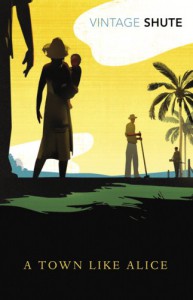Sarah's Library
I read pretty much anything, from fantasy (City of Stairs by Robert Jackson Bennett) to romance (Bared to You by Sylvia Day) to classics (Heart of Darkness by Joseph Conrad). The only genres I don't read are self-help and comic books/graphic novels.
A Town Like Alice by Nevil Shute

19/7 - This was written in 1950, it uses language common to 1950. These facts have to be remembered when reading A Town like Alice, and reacting to said language. The characters use words like 'Abos', 'Nips', 'Boongs', and other offensive names for the indigenous people of Malaya and Australia, and the invading Japanese forces. This type of language makes me feel uncomfortable while reading the book, but at the same time I accept that this was simply the way people talked in those days. So, if I (or any other reader) wants to read books written before this decade, I have to be aware of the possibility that there is going to be some offensive - racist, sexist, misogynistic - language, and I can't yell and scream at the book because of it.
On another, happier, note, I'm really enjoying the book. To be continued...
20/7 - On page 250 there is this sentence
Lying in the shallow water as the sun rose she discovered a number of bruises on her person, and reflected on the narrowness of her escape from a fate worse than death.
Considering Jean's pragmatic, no nonsense personality, age, life experience, and general level-headedness I have to wonder whether that was meant to be ironic. Joe has already asked her to marry him, so they'd only be jumping the gun a little. It's not as if Joe was just another boyfriend in a long line of others, with no possibility of a future together. Plus only a page earlier she was telling him that
If you can wait till we're married, I'd much rather, but whatever you do now, I'll love you just the same.
Her apparent willingness to have sex with Joe is what made me think that the remark about a fate worse than death couldn't have been made seriously. She's not such a ninny as that, to make such a fuss over something that she was perfectly willing to do, just not quite yet. I think that little sentence was completely out of character for who Jean has been shown to be throughout the rest of the book.
Later - I love the computer game Sim City. I love the way you start out with a blank canvass and you build your city bit by bit. You build a power station; and roads; and police and fire stations; and then residential, commercial and industrial areas and watch them grow and prosper. I love the feeling I get when I just sit back and watch the city grow, high rises taking the place of 'mom and pop' stores, shiny apartment blocks replacing little shacks, stinky polluting factories being replaced by clean industrial parks. I'm getting the same feeling while reading about Jean's plans for Willstown - her shoe factory, the stores she wants to set up to feed/clothe/amuse the workers for her factory, all the other innovations she wants to implement. I can truly feel her excitement over what Willstown could become, what she could make it, with help from Joe and the locals. It's really exciting, and I can't wait to read how she goes about it. The only problem is that there's less than 100 pages left, and I want there to be more, more room for more explanation, more details on the building of Willstown (which, after this could almost become Jeanstown). To be continued...
21/7 - Great book, just wish it had been a little longer, I didn't want it to end. While Willstown was fictional, there is a Burketown (also mentioned in the book, and could possibly be considered the inspiration for Willstown). Unfortunately, or fortunately depending on how you look at it, Burketown didn't prosper under the care of a Jean-like character and nearly 150 years after its establishment it's still languishing with a population of only 173. Their peak population occurred in 1911 at 265. They don't even have a public swimming pool, a dream of Jean's for Willstown.
 7
7







